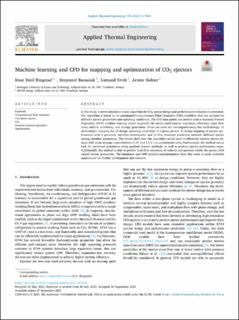Machine learning and CFD for mapping and optimization of CO2 ejectors
Peer reviewed, Journal article
Published version

Åpne
Permanent lenke
https://hdl.handle.net/11250/2824340Utgivelsesdato
2021Metadata
Vis full innførselSamlinger
Sammendrag
In this study, a novel simulation-based algorithm for CO2 ejector design and performance evaluation is presented. The algorithm is based on an automated Computational Fluid Dynamics (CFD) workflow that can account for different ejector geometries and operating conditions. The CFD data points are used to train a Gaussian Process Regression (GPR) machine learning model to predict the ejector performance indicators; efficiency, mass flow rates, outflow uniformity, and entropy generation. Three use cases are investigated using this methodology: 1) performance mapping for off-design operating conditions of a given ejector, 2) design mapping of ejector performance with 5 geometry variables investigated, and 3) flow structure prediction between different ejector mixing chamber geometries. The results show that this algorithm can be used to efficiently explore ejector designs with mean average errors between 0.07 and 0.1 [–] in entrainment ratio. Furthermore, the method can to look for optimized geometries using gradient descent methods, as well as produce ejector performance maps. Additionally, the method is able to predict local flow structures of velocity and pressure inside the ejector with varied ejector geometries. The databases and GPR method implementation from this work is made available open-source for further development and research.
